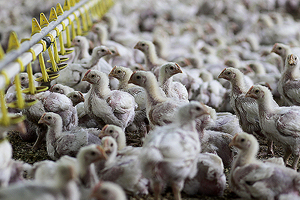ASPCA tackles US poultry org on welfare guidelines

The American Society for the Prevention of Cruelty to Animals (ASPCA) has written to the National Chicken Council explaining its efforts dedicated to improving the welfare of chickens raised for meat in the US.
The welfare group claims to have research showing that the current unprecedented growth rates and standard living conditions of chickens not only pose serious concerns for their welfare, but may also present food safety risks.
In the letter, the welfare organisation urges the NCC, which will release new guidelines for chicken welfare before the end of this year, to update their guidelines with meaningful recommendations to address welfare concerns related to both growth rate and husbandry, reflecting the values and expectations of chicken consumers.
“Genetic selection for more breast meat and faster growth has led to inactive chickens with insatiable appetites, suffering from higher rates of heart failure, low stamina, laboured breathing and lameness. Overcrowding due to excessively high stocking densities,” the open letter said.
“The ASPCA’s description of poultry production in the United States is not based on fact and in no way represents the realities of modern poultry production or the health and welfare of today’s chickens,” said Tom Super, National Chicken Council vice president of communications in response. “The US national broiler flock is incredibly healthy and is the envy of the world. Mortality and condemnation rates for broilers, the most sensitive indicators of the health and well-being of any flock, are at historical lows.
“In fact, if we reverted to the way we used to raise chickens several decades ago, the mortality rate for chickens would increase 490%. Because of better nutrition, breeding, genetics, veterinary attention and technology, which include optimum growing conditions within climate-controlled barns, it takes less time for chickens to naturally reach market weight – all without the use of hormones or steroids. A common misconception, broiler chickens are never caged and free to roam within barns, interact, and eat and drink at will.
“From a pure business standpoint, it would make zero business and economic sense for a farmer to do anything to a bird that would harm it. The birds are their livelihoods and chicken producers want to do everything possible to keep them healthy.
“To assist chicken producers and processors in this effort, the National Chicken Council developed the NCC Animal Welfare Guidelines and Audit Checklist which have been widely adopted within the industry. Periodically revised, this year’s updates will cover every phase of a chicken’s life and will offer the most up-to-date, science-based recommendations for the proper treatment and humane care of broiler chickens.”













